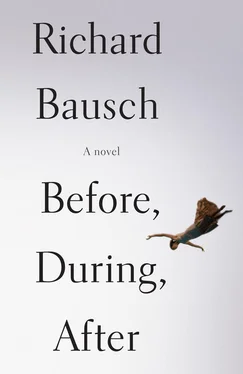“Eighty?” Iris said.
“Two.”
“What?”
“Two percent. And that translated into thirty million deaths worldwide.”
“God,” Natasha said, low, “can’t we talk about something else?”
“People will look back years from now,” said her husband, “and wonder how we went through the days.”
There was a sense of being threatened that was always there, like the dark outside windows in a well-lit house. Even when you didn’t talk about it, the effects of it made themselves felt. The cleanup in New York and at the Pentagon continued, and each night there were more stories about all of it.
They went together and bought a small used car for Natasha, and he rode with her as she drove over to Iris’s to show it off. Iris was irritable with them and said they shouldn’t have spent the money, they could have taken her car, since she seldom used it anymore, and it was a good car, with few miles on it, only five years old. Faulk watched his wife handle the old woman’s temper. She kissed Iris on the cheek and said, “You need your wheels, lady, and you know it. And we have the money.” She looked at Faulk. “Don’t we, honey?”
“We do,” he said, delighted at the smile on her face.
It was no surprise to him that she was most comfortable around Iris. They spent a lot of time over at the old woman’s house, and Iris liked the company.
At times, because they were mutually horror-struck at the history they were living through, he could believe they were coming out of their own personal trouble. Their little daily rituals were a hedge against the grief that was everywhere, and the two of them became adept at a sort of careful thoughtfulness with each other.
Each morning when they arose — sometimes separately, sometimes without much sleep — the first few seconds they were together felt easy enough, coming from the fog of dreaming and drifting, and they prepared for the day as if nothing were wrong. He would make her breakfast, and they would eat, or try to, talking aimlessly about what was in the papers. He went to work like anyone else, leaving her in her little space off the dining room, laying out her own work for the day, tubes and brushes and the small squares of hot-pressed paper.
Often, though, they were coming from hours of sleeplessness or, worse, nightmares. She kept having the nightmares. He worked at being patient and gentle. And when she would drift off, and sleep would not come for him, he would go into the little room off the master bedroom where his desk was, and the spiral notebooks, the two volumes of The Summa Theologica .
Sometimes he was in that cluttered, narrow room when the sun came up.
In the darkness, she would lie quiet, having awakened from the bad dreams, aware of him in the other room, and she felt small and spoiled and trifling, angry with herself for everything, even unimportant matters: her unspoken annoyance with him for minor habitual things she had never thought of before living with someone — the fact that he was squeamish about roasting a whole chicken because it made him too aware of the thing as a carcass; his tendency to leave his clothes hanging on doorknobs or draped over chairs; his late hours, sitting up reading or writing, and his refusal to allow her into that world with him (they did not talk anymore about what he was reading or what he was writing; if she broached it as a subject, he changed the subject). But these were negligible problems, requiring adjustments that would have been necessary anyway. Withal, there were the other matters, the mud on the floor, as Iris would put it: the undeniable and increasing unease in lovemaking; the instances of recurring panic — the latest when she remembered writing Iris’s address in the sand and felt it as a certainty that Constance had indeed seen Nicholas Duego at the airport. These nights, in the dark, alone in the bed, she experienced the worry about that, and then in the wooziness of half sleep actually hoped it had been Duego and that he was spying on her so he could see that she was not telling anyone, he would know that his secret was safe with her, and he did not have to do anything else.
And then she would wake and gasp, berating herself silently for the ways in which the fierceness of the anxiety kept her from any kind of thought about the general suffering in its terrible scale coming from the devastations of September, the horrors of the new war. She told herself that she had no right to complain about anything. She was safe. They were safe. From his little study there sometimes came the sound of the music he loved, Mozart’s Clarinet Quintet, and the concerto, too, played softly so as not to wake her — and if she had been asleep, it would not have awakened her.
Occasionally in their mornings he would speak to her about what was in the paper, the articles about the war and about the continuing work in the rubble of the Trade Center and in Washington, the details of the passengers of Flight 93. It was all just words to her, all a matter of fighting to maintain the half smile or the look of concern, feeling the fear rise, the helpless stirring of rage at herself for it, watching him struggle with his own intuition and anxiety about what was between them.
Neither of them could find the way to break through.
One morning in the middle of November, after spending long, mutually sleepless hours apart, they sat across from each other in the kitchen, with the paper on the table between them. Each was holding a section of it open, as if neither of them wanted to look at the other, though their exchanges that morning had been quite unruffled and warm. Before he was dressed he had sat on the edge of the bed and called Iris to ask if she wanted to come over. Iris had said she was planning to sleep some more. He apologized, put the receiver down, and showered and dressed and then walked into the kitchen to make the omelets for them. But neither of them had eaten much. Minutes went by with the only sound being the shuffling of the pages and the coffee cups being set down on the table. “This is terrible,” he said suddenly.
She looked up, thinking it was something in what he was reading.
“Isn’t it,” he said.
“Oh, Michael,” she said. “Let’s not look at it.”
“I don’t know how much longer I can stand it.”
“Honey. We — we all have to stand it, somehow, don’t we?”
His voice rose: “I’m not talking about the war.”
She sought to control the crying that welled up. “Please,” she murmured. “Don’t shout at me.”
He stood and moved to the door and paused, then sighed. “I’ll see you later.”
“I’ve got a doctor’s appointment this morning,” she managed.
He opened the door, hesitated, but did not look back. “You all right?”
“Routine.”
Now he turned. “Nothing specific?”
“It’s routine, honey.” She smiled and shook the strands of dark hair from her brow.
He looked at her hands where she held her part of the paper. She was trying so hard to be what he needed. “Sure you’re all right?”
“Routine.” She kept the smile, but a tear trailed down one cheek.
He came quickly back to the table and kissed her hair, feeling like a bully.
“I’m just tired,” she got out.
“See you,” he said, and her smile changed slightly, her lips trembling a little. He kissed her there and then hugged her. She stood into it, and they remained that way, arms around each other, for a long moment.
“What should I make for dinner?” she asked, wiping her eyes with the heel of her palm.
“Can’t think about it now.”
“No, I know. Me, too.”
“Not much appetite.”
“No.”
“Well, spoil yourself today.”
Читать дальше












